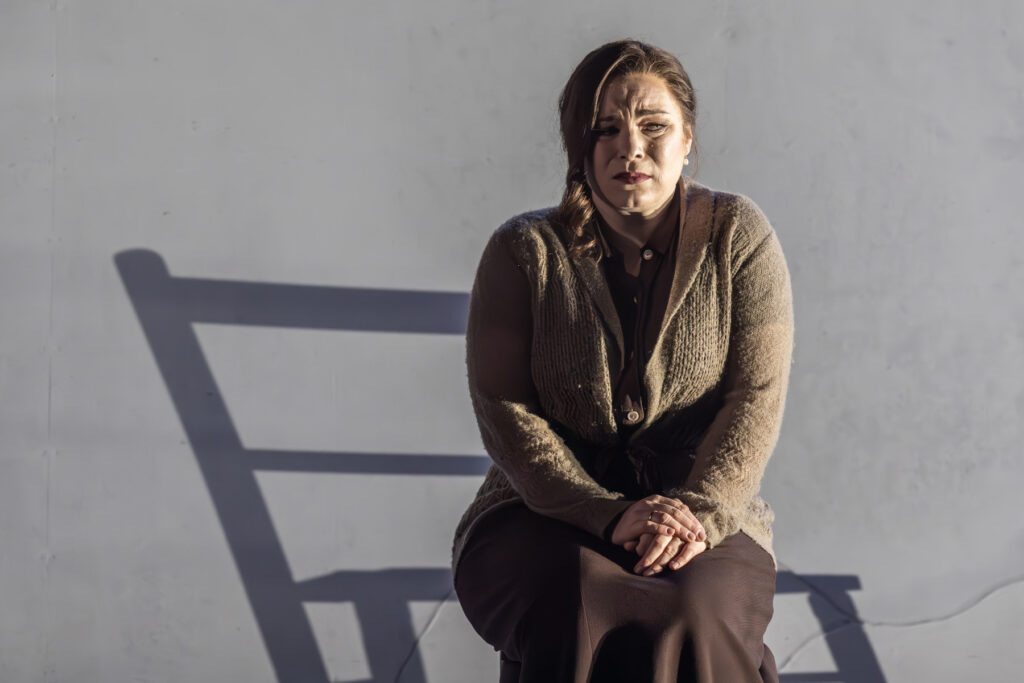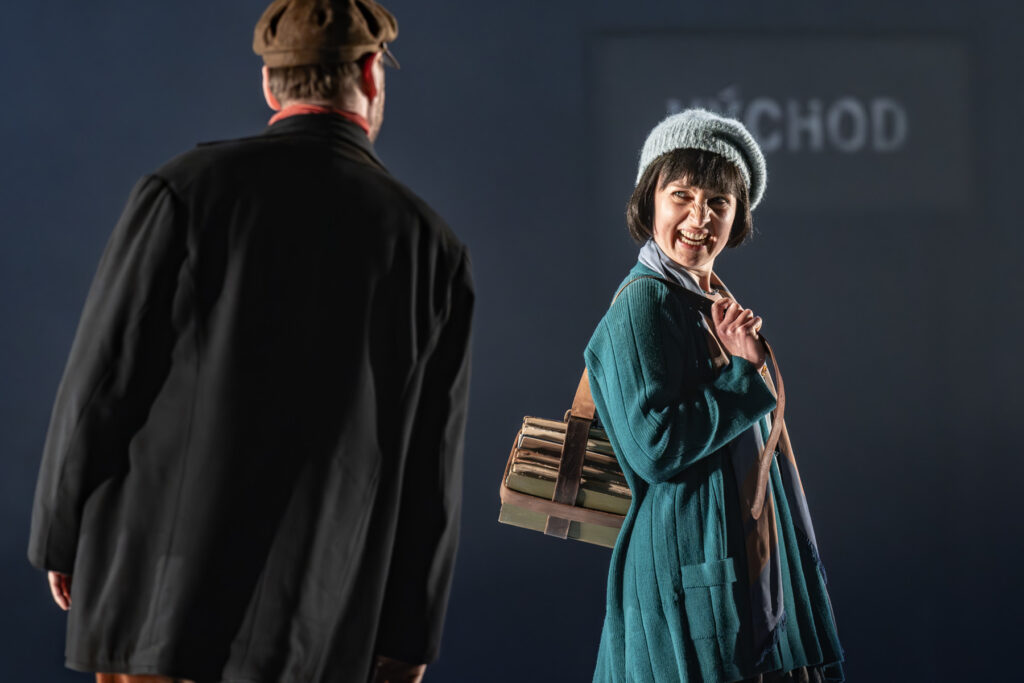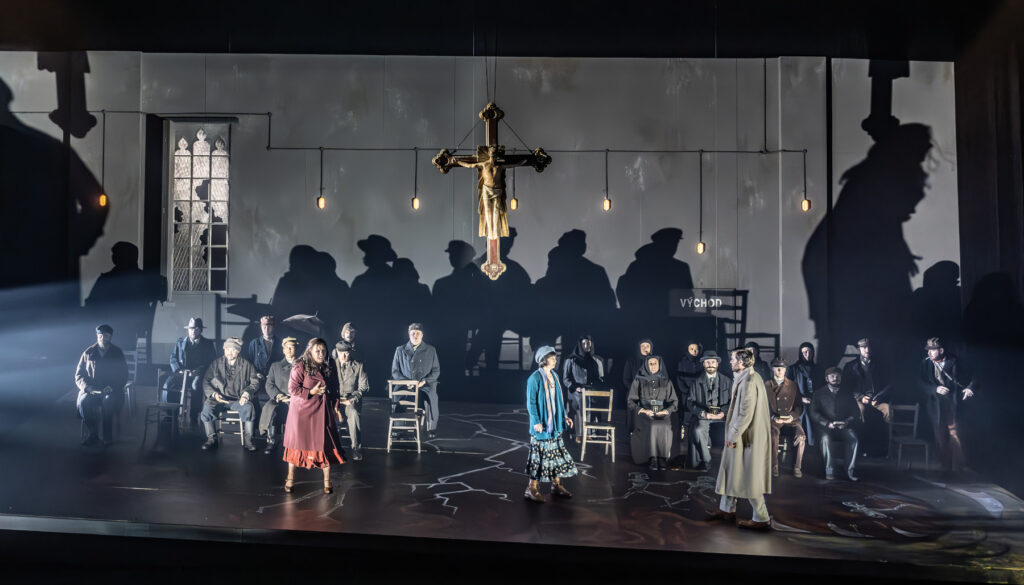Guilt, shame and suicide are not everyone’s cup of tea when it comes to country house opera. And if Janáček’s angst-ridden masterpiece is not the obvious stimulant you’re hoping for, given the current political uncertainties, not least the weather, one can at least enjoy a fabulous cast for David Alden’s new production of Kátya Kabanová at Grange Park Opera. The Welsh-Ukrainian soprano Natalya Romaniw in the title role should stop anyone wanting to throw themselves in the nearest river, unlike our troubled heroine whose emotional fragility leads to despair thanks to a loveless marriage, a tyrannical matriarch, a passionate affair and unfulfilled dreams of freedom.

Alden has plenty of form with this work (having worked with Kátya all over the world for over twenty years) and, along with designer Hannah Postlethwaite, he offers a stark, uncluttered concept: bare walls surround a sloping platform shorn of any domestic or social setting to reflect the comfortless family life Kátya endures with her husband and odious mother-in-law. At the rear, half a dozen bare light bulbs convey a prison-like environment, while an image of the Volga hints at the fatality to come. Grotesque shadows (courtesy of Tim Mitchell) later indicate all you need to know of Kátya’s psychological torment, her self-loathing suggested in monstrously distorted silhouettes. A derelict church, a towering crucifix and scattered chairs create further desolation for the storm scene of Act 3, the stage briefly filled by an umbrella–wielding chorus and a debate between the science teacher Kudrjas and drink-sodden merchant Dikoj over the impact of electrical forces and the wrath of God. Just visible on the floor are outlines of skeletons, the community’s age-old superstitions implicit.
Throughout, Alden wants us to focus on character interaction, here given well-defined and powerfully sung portrayals. Indeed, Grange Park Opera is fortunate to have such high-profile singers, with voices that, arguably, are better suited to the world’s larger opera houses. Admittedly, Janáček scores for a large orchestra requiring voices with carrying power. And that is here in abundance in well-projected singing with vocal power to burn, if occasionally supplying over generous decibel levels. For all Romaniw’s empathy with the composer’s most sympathetic heroine, there are moments when the essential gentleness of the God-fearing Katya is missing, her strong delivery almost overwhelming in its force, but sailing with ease over the Gascoigne Orchestra. Yet from her first tortured appearance, Romaniw perfectly captures the awkwardness of Kátya, her sense of defeat and frustration embedded in every movement and vocal nuance.

No less powerful is Thomas Atkins as the would-be-suitor Boris, whose clarion tenor rings out with a conviction that belies any sense of youthful inadequacy or image of him as a lazy, put-upon nephew. His uncle, Dikój, is taken by a tottering Clive Bailey who sings with a hectoring authority. Adrian Thompson as Kátya’s husband Tichon throws his all into his vulgar portrait, and, if a little too old for a mummy’s boy, he nicely brings out the paradox between brutality and weakness as he negotiates his relationship with his wife and mother.
Susan Bullock is well cast as Tichon’s forbidding and hypocritical mother, Kabanicha – a stiff-backed and tight-lipped figure chilling in her false respectability though not incapable of indulging in some slap and tickle with Dikój who submits all too willingly to her S & M attentions. Even when she takes the hand of Tichon after Kátya’s suicide, there’s still a disturbing froideur in her manner. By contrast, Katie Bray sparkles as the carefree and impulsive Varvara. She makes a delightful foil to the other women and brings a much welcome playfulness to her exchanges with Ben Hulett’s blithe Kudrjas. No wonder she is enamoured with his affable nature and bright tenor.

In the pit Stephen Barlow brings out all the febrile drama of the score, the players of the Gascoigne Orchestra responding keenly to its cinematic qualities and jagged edges. Kátya may not be a feelgood opera, but these blazing performances above and below the stage are well worth hearing.
Performances until 12 July.
David Truslove
Kátya Kabanová
Music by Leoš Janáček
Libretto Leoš Janáček, based on The Storm, a play by Alexander Ostrovsky
Cast and production staff:
Kabanicha – Susan Bullock; Tichon – Adrian Thompson; Kátya Kabanova – Natalya Romaniw; Varvara – Katie Bray; Dikój – Clive Bayley; Boris – Thomas Atkins; Kudrjas – Benjamin Hulett; Kuligin – Jonathan Kennedy; Glaša – Jennifer Statham; Feklusa – Béatrice Dupuy; Rybar – Benjie del Rosario; Žena – Alison Dunne
Director – David Alden; Design – Hannah Postlethwaite; Costumes – Gabrielle Dalton; Movement – Lyne Hockney; Lighting – Tim Mitchell; Gascoigne Orchestra and Grange Park Chorus; Conductor – Stephen Barlow.
Grange Park Opera, West Horsley, Surrey 16 June 2024
Top Image: Katya (Natalya Romaniw), Tichon (Adrian Thompson), Kabanicha (Susan Bullock), Glasa (Jennifer Statham), and Varvara (Katie Bray).
All photos by Marc Brenner.